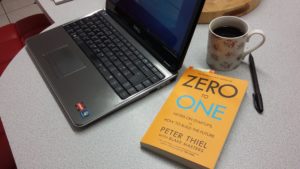5 Things I Learned About Being A Wage Slave from ‘Zero to One’ by Peter Thiel
Zero to One is the International best selling book by Paypal founder and billionaire Peter Thiel. Thiel, who was also an early investor in Facebook, has been at the forefront of tech start up success for well over a decade.
Thiel also famously bankrolled Hulk Hogan’s court case against web content farm Gawker leading to it’s dissolution. So when he writes a book titled ‘Zero to One: How to Build the Future‘, you read it.
Reading a book on tech start-ups is a strange idea for most of you. Let’s face it: you’re probably not going to be the next Elon Musk or Thiel. But does that mean this book has nothing to offer you?
Here’s what you do when you read a book that doesn’t obviously immediately apply to your own situation: Think about what you’re reading in the context of your own life. What can you take from the book and apply to your career or vision as a Dad?
Zero to One is a Short Book with Plenty to Get you Thinking
There are valuable lessons from ‘Zero to One’ that go beyond the realm of Silicon Valley and the tech boom of the last ten years. Although it’s impressive to think that the likes of Mark Zuckerberg (Facebook), Jack Dorsey (Twitter) and Thiel came from nothing to billions it’s highly unlikely that you’ll emulate their success.
But that doesn’t mean there aren’t lessons to learn from Thiel’s work and observations. I’m no self employed guru – I collect a wage just like you.
But that doesn’t mean Zero to One has nothing to offer us clock punchers. In fact the opposite is true. Here’s what I learned.
1. Be a Value Investor
The term ‘Value Investor’ was a new one to me until recently. I’ve been reading Michael Lewis’ ‘The Big Short‘ where one of the main characters – Mike Burry – is described as a ‘value investor’. He looked for the hidden values of companies and stocks and invested there. This meant playing the long game but ultimately paid off in a big way.
In Zero to One, Thiel recounts how early investors in Facebook reaped massive rewards. One artist that helped decorate the Facebook office was paid in stock that later became worth $200 million. His small value investment turned into a big win.
Which made me think: what opportunities am I missing with undervalued investments and opportunities? Could you be overlooking a key contact or opportunity that would make big wins with minimal effort?
Value investing means putting you neck on the line. It means seeing the value when others see trash. Are you walking past a good idea because you can’t see it’s potential?
2. Be a Value Producer
How do you become valuable to your employer? By being the guy who steals the least number of paperclips? Or works the longest hours?
Or are you the man who generates the most value in the least amount of time. It might be sales or new clients, but it doesn’t have to be.
Here’s an example: what if you paid for yourself to go on a coaching course so you could mentor other staff. Would that make your more or less valuable to your company.
Or what if you could write press releases that your PR department could drop into the inbox of local media and get published with almost no edits? That would make you pretty valuable to them (I did this for a former employer).
Find the way to bring the most value to your employer. If you don’t have an employer that rewards value, find a new one.
3. You are Always a Salesman
You might have heard the saying ‘Everything is sales’. But is being a salesman really that important? Here’s Peter Thiel’s take:
In Silicon Valley, nerds are skeptical of advertising, marketing and sales because they seem superfical and irrational. But advertising matters because it works. It works on nerds, and it works on you.
He goes on to show how a good product alone is not enough to set you apart, you must know how to market it.
Marketing is all around you – you’re being sold something right now. I’m selling you the product of this blog post which you’re spending your time reading (I’m grateful by the way).
This post and this website is designed to keep you here as a long as possible and at the end of the post (which you’ve probably already skipped to) there’s a big green button that will take you to a page where you can sign up to my newsletter.
The button is green because studies show you’re more likely to click on a green button than a red one.
There are also buttons on either side of the screen to encourage you to read more than one topic when you visit. This blog post is designed to keep you reading to the end. Is it working?
This website is part of a brand that I’ve been building for over a year now. It’s an authentic brand because it’s me.
I’ve poured my heart and soul into my writing and spoken of things on here that even my wife didn’t know about (she does now!).
Which leads me on to the point of all this. The best product that you can market is you. If you work in a corporation or an office your personal brand matters.
So look for ways to boost it – new projects, more assertive, better networking. Be a salesman of yourself. Once you can sell your personal brand, you’ll be in a good position to sell other things and add value to your employer (see point 2).
4. Be an Idea Critic
What does this mean? James Altucher has a popular book ‘Become an Idea Machine‘ which builds on his daily practice of coming up with ten ideas a day. Ideas are important – Peter Thiel had the idea of making it easy to send money via email (enter PayPal) which turned into a massive global success.
But he also highlights the importance of those who recognise good ideas early on. And invest. Early investors in Facebook (like Thiel) made unbelievable profits. Those investors recognised a good idea and put their money where their mouths were.
They made a fortune but only because they were able to discern the difference between a golden goose (social media empire) and a turkey (e.g. Solyndra that made cylindrical solar panels – I know right?)
The take-home is this: you don’t have to have your own start-up to make money. You just need to have a good eye for what a good idea is.
Or isn’t.
How do you acquire this skill? Trial and error is obvious but if you could cut out the error, you would, wouldn’t you.
Early in the book, Thiel points out what he means by Zero to One. A 0 – 1 concept is something that has never been done before and no-one has thought of (e.g. sending money by email at a time when most Americans were still using AOL).
A 1 to n concept merely takes an existing idea and tries to improve on it. Yes it could be successful, but is it something new?
That’s the key to massive successes like those featured in Thiel’s book. Those which created something completely new and those that took something that already existed and tried to make it better.
Could this translate into your personal brand? What can you do (or learn) that no one else in your company or organisation is able to offer. Learn that skill and your personal value goes up 10x.
5. Buy Good Books in Paperback
How do you know whether a book is going to be good or not? The truth is you don’t. But if you know an author and the book has been highly recommended, the chances of it blowing are significantly smaller.
Recently I’ve switched back to buying more books in paperback. There are a few reasons for this:
- I like thumbing through the pages of a book – you can’t do that with a Kindle
- I’ve started highlighting more in pen and adding notes. Pen doesn’t come off your Kindle very easily unless you use acetone in which case you can melt the letters off the keys (if you have the one with the key pad).
- I can show people the book either in real life or on one of my Periscope broadcasts (book related Periscopes are the most popular by far).
If you like a book enough that you’ll read it again and want to take notes, get the paperback.
As a side note, I don’t lend people my books anymore. There were too many that considered it a permanent loan and either gave my books to someone else, ‘forgot’ that they had them or denied all knowledge of me lending them in the first place. And they were the majority.
Now, I’d only lend a book if I didn’t care if I got it back. Which is never.
6. Don’t be A Slave to Salary
Here’s how salary negotiations normally go (from my personal experience of 16+ job interviews).
“What are your salary expectations.”
“Hmm this should be a positive move so somewhere in between (n = what I’d settle for) and (n = a figure that’s in my wildest dreams).”
(Interviewer pulls a face)
“We’ll see what we can come up with.”
Do you get the job? I’d say about 1/3 of the time you’ll get what you wanted.
But what if you took a different approach?
Thiel reveals how he never trusted employees who were only interested in salary (rather than being paid in stocks). Their over reliance on salary meant they were only really in it for themselves. From Thiel’s perspective, someone who is willing to forgo the big bucks in return for the opportunity to make millions down the line is more likely to put in the hours required to build a great company.
A Dad with a scarcity or fixed mindset would say ‘I just work here: I do my hours and go home’ Where as a Dad with an abundance mindset asks ‘What can I give to others today that will make this organisation/company great?’
A friend recently said this to me:
Salary is really just vanity
Which is true to a point. Salary is pretty meaningless if you’re trapped in a job that doesn’t inspire or challenge you or offer near limitless possibilities to improve, progress and become more successful.
Conclusions
I’ve heard people refer to earners like me as ‘wage slaves’. It’s as if it’s a bad thing to collect a wage. But I disagree. I have a job and career which fulfills me, a regular income, perks and when I come home I get to work on my other projects (like this) or mess around in the garden.
If you punch the clock like me, you’re not a second class citizen. You can be successful in your own way without being the next Peter Thiel.
You can buy Zero to One here (Amazon)
And you can click on the big green button to sign up for my emails:




Interesting. I think the big takeaway is providing value in some way no?, so even if you are doing something like making the tea or sorting out recycling the emphasis is on producing something of use to fellow staff members.
Point 6 is one I have to keep telling myself, with my current role it really is a case of playing the long game, down here in London it is ALL about how much you earn (well at my age and stage too!). I just dropped a little under £300 for some professional training that my employer wouldn’t cover, but I have to keep telling myself it is all bricks in the wall which will compound and be useful later!, for the time being its eggs and oats until payday 😉
Hi Ed, thanks for reading and I agree. It doesn’t take much to bring value to other people’s lives. Something as mundane as tidying up after yourself instead of leaving it to the office cleaner can have a big impact on people. I’m sure that you will see a return on your £300 investment before too long. Plus, eggs and oats are super-healthy!
I am going to buy this book on your recommendation, points 2-6 I can wholeheartedly agree with – as I still don’t really understand point 1 from a personal level alas.
An extra point I must add is to just take action, I have been able to almost double my salary based on mini-investments that were considered time wasting, reading about my industry and going that bit further in background learning when put on projects as a temp ‘resource’, consequently .I had my deep core skills and a steady but wide base and thus seem to be able to turn my hand to anything.
Sadly, I also squandered a lot of money on training that I never put to use, wasted money, wasted time earning it. That would have been better in the bank accumulating even postrecession interest.
Hey Jack, thanks for reading and for your comment. I hope you enjoy the book. I certainly did. I’m sorry to hear that point 1 was difficult to understand. An opportunity could be anything or anyone! I found out recently that you can invest seed money in tech start-ups on websites like Seedrs (no affiliate!). Being able to see value that others don’t is one of the keys to wealth.
Warren Buffet – probably the most famous value investor in the world – has made his fortune from buying stock in companies that have continued to grow and make him money. He famously said:
Hey Jack, thanks for reading and for your comment. I hope you enjoy the book. I certainly did. I’m sorry to hear that point 1 was difficult to understand. An opportunity could be anything or anyone! I found out recently that you can invest seed money in tech start-ups on websites like Seedrs (no affiliate!). Being able to see value that others don’t is one of the keys to wealth.
Warren Buffet – probably the most famous value investor in the world – has made his fortune from buying stock in companies that have continued to grow and make him money. He famously said:
Hello sir, I’ve always aspired to be an entrepreneur. I’ve read my books on entrepreneurship and they’ve helped in changing the way I look at the world. But what makes this book special is its different approach. No book has ever made me this eager to read like this one. I was scrolling through google to get an idea of what the book is all about. I really loved your review. Thank You!